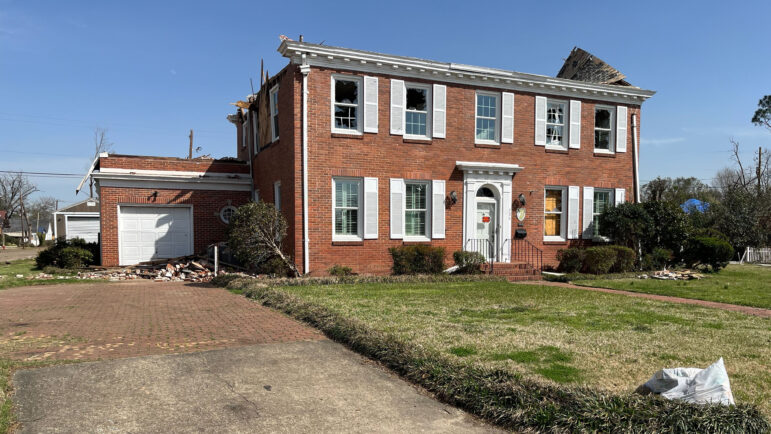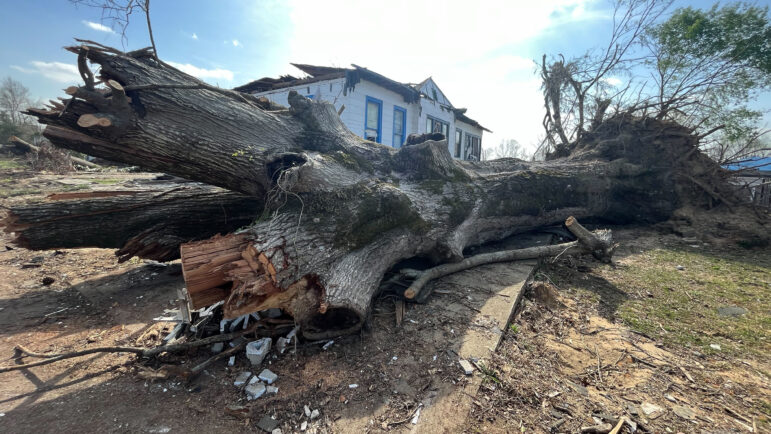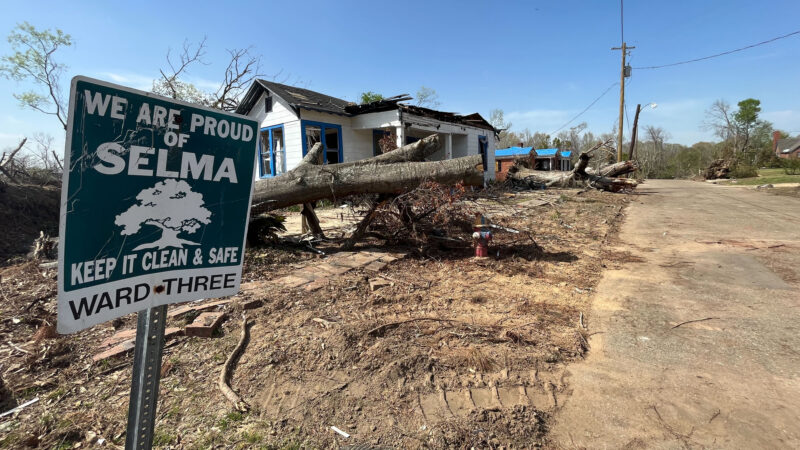How this year’s Selma Bridge Crossing could mark a community renaissance
SELMA, Ala. — President Biden will travel to Alabama tomorrow for the annual commemoration of “Bloody Sunday,” the infamous day in 1965 when some 600 civil rights marchers headed east from Selma in support of voting rights. The marchers only made it six blocks to the Edmund Pettus Bridge before they were attacked by state and local lawmen, driving them back into the city.
As they always do in the annual tribute, people will be making a symbolic crossing.
But things are different in Selma this year.
On Jan. 12, an EF2 tornado carved through the heart of the city. With winds up to 130 mph, the twister left behind a violent, ruinous path that destroyed hundreds of homes.
“It’ll never look the same as it did,” says Steve Criswell, who has lived in Selma for 57 years. He speaks from the porch of a home that’s set to be demolished later this month.
“The house we’re at right now was built somewhere between 1846 and 1855,” he says. “So much of our history is going to be lost.”

Though the tornado left behind a kind of damage that will live with Selma forever, Criswell also says that the process of scarring can be an opportunity.
“People were just coming out the woodwork,” he says about the hours following the storm. “It didn’t matter what color you were or what your age was — everybody helped everybody.”
In the weeks since the storm, the Temple Gate Seventh-day Adventist Church has been a center for recovery efforts. Every Thursday, volunteers show up to share bread, salad kits, and even pastry boxes with storm victims who circle the block in their cars.
Nearly one third of Selma’s residents live under the poverty line, says Thiea Wilson, the pastor at Temple Gate. It’s this population that was most directly impacted by the tornado.
The church sits right in the center of the devastation and Wilson says she’s thankful for this position right now.
“We were blessed to be here,” she says. “To be a lighthouse in a dark time for this community and provide a safe haven for those who need so much.”

Like Criswell, Wilson sees the tragedy as a chance to build back better, sharing the phrase that Biden uses often. But this means more than just infrastructure.
“People all throughout Selma are trying to be very intentional about tearing down the racial walls, the class wall, the economical walls, that have often separated Selma,” she says. “I want to see the spark of hope.”
This weekend’s commemoration is an essential part of how the community will move forward, particularly the day’s main event: the Bridge Crossing Jubilee.
Former Alabama state Sen. Henry “Hank” Sanders and his wife, Faya, started the event nearly 30 years ago.
Sanders says the Jubilee is an opportunity to understand and appreciate what residents still have in Selma and to rebuild a beloved community. Biden’s presence will only amplify this impact.
“If the president of the United States thinks it is important to be at the Bridge Crossing Jubilee, then the tens of thousands who come will become twenties of thousands,” he says. “Because they know how important this is.”

Sure, things will be different this year. But that’s not a bad thing, according to Sanders.
Usually, when people come to Selma for the weekend, they don’t stay for long. They come for the crossing — what Sanders calls a “pilgrimage,” and to have “their spirit renewed with the symbolism and power of the moment.”
But, usually, people won’t spend the night, or even buy a sandwich.
This year however, visibility is an opportunity for support.
“Cross the bridge. Be renewed,” Sanders says. “Share your experiences, gather the information, get stronger. But also, be a bridge to Selma.”
Additional reporting by Juma Sei and Kyle Gassiott.
9(MDA2ODEyMDA3MDEyOTUxNTAzNTI4NWJlNw004))
40 years after ‘Purple Rain,’ Prince’s band remembers how the movie came together
Before social media, the film Purple Rain gave audiences a peak into Prince’s musical life. Band members say the true genesis of the title song was much less combative than the version presented in the film.
Park Fire in California could continue growing exponentially, Cal Fire officer says
Cal Fire has confirmed that over a hundred structures have been damaged in the Park Fire, which grew overnight near Chico, Calif. Difficult firefighting conditions are forecast through Friday night.
Checking in with Black voters in Georgia about the election, now that Biden is out
Some voters who could be key to deciding who wins Georgia. What do they think about Vice President Harris becoming the frontrunner in the race to be the Democratic nominee?
Tahiti’s waves are a matter of ‘life and death’ for surfing Olympics
Tahiti's Teahupo'o wave has a slew of riders for the Paris 2024 Olympics. NPR finds out why it's called one of the most dangerous waves.
Researchers are revising botanical names to address troubling connotations
Since the mid-1700s, researchers have classified life with scientific names. But some of them have problematic histories and connotations. The botanical community is trying to tackle this issue.
A spectacular opening ceremony wowed a global audience despite Paris’ on-and-off rain
The Paris Olympics opening ceremony wowed Parisians, fans and most everyone who was able to catch a glimpse of thousands of athletes floating down the Seine to officially begin the Games.



